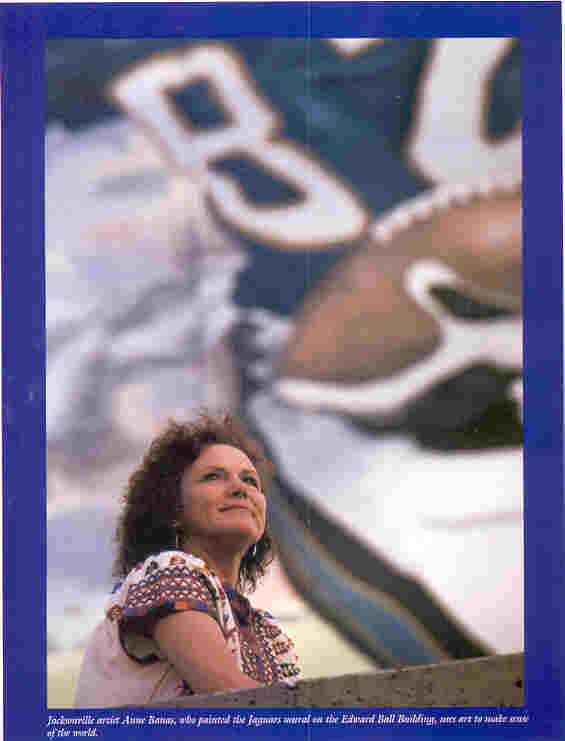Click
Here for a Virtual Tour of Anne's Current Show
Map
& Directions
Neighborhoods Magazine
 |
 |
| Anne (seen underneath First Team mural) was featured in Neighborhoods in 2001. | |
|
Big is Better, by Fred Harmann That sums it up for Anne Banas, a Jacksonville artist who is an expert at painting murals... make that massive murals. Evidence of her remarkable talent is readily available and can be seen easily on the rear wall space of a 12 story office building in downtown Jacksonville. Titled "First Team," it is the largest hand-painted mural in the United States and depicts Coach Tom Coughlin and five players of the Jacksonville Jaguars. The wall space covered by the painting is 215 feet wide and 96 feet tall, providing a "canvas" of more than 20,600 square feet... so huge an art endeavor that Banas hired 11 other artists to work with her. The mural, readily visible from I-95, is on the rear wall of the Edward Ball Building at 214 N. Hogan Street. "Sure, it can be done," Banas remembers telling First Union Bank officials when they first approached her about the project in late 1997. Later, in the privacy of her studio, she reviewed her initial confidence by asking herself, OK, it can be done, but how?" While working on the logistics of the project in her studio, the artist and bank officials met several times to discuss the content of the mural and eventually settled on "...a group of enormous Jaguars charging down a field." By April 1998, the bankers and Banas felt ready to meet with Wayne Weaver, principal owner of the Jaguars, to discuss the project. While he liked the concept, Weaver said he would prefer to have some players in the mural. To the surprise of no one, Weaver prevailed and selected Coughlin, receivers Keenan McCardell and Jimmy Smith, defensive players Joel Smeenge (who is no longer with the team) and Renaldo Wynn plus kicker Mike Hollis to appear in the mural. After studying photographs of those players, Banas painted a model of how the mural finally would appear. The model painting is 35 inches wide and just under 18 inches deep... a tiny but vital version of the finished product that would guide the step-by-step development of the mural. Before work on the mural could begin, Banas told bank officials, the brick wall would have to be pressure washed, followed by an application of a primer coat of paint. When that was completed, 14 levels of scaffolding were erected, effectively making every inch of wall space available to the team of artists. Next, the team used chalk to convert the entire wall into a grid of squares four feet by four feet, units of 16 square feet that would match squares of one inch by one inch in the model painting. Once the grid was completed, the artists used chalk to outline the figures of the football players and their coach. The team started the chalk work at the ground level and worked its way up for two reasons: to gradually become accustomed to the increasing elevation and to alleviate Banas' intense fear of heights. "Was I terrified? Oh, hell yes," she said, remembering the early days of the project. Working on the mural apparently cured her phobia. By the time the team completed the chalk grid, it was well after Memorial Day of 1998 and hot weather had set in. Wearing hard hats and safety harnesses didn't make conditions any more comfortable, so the team started at 6 a.m. each workday and quit at noon. Once the painting began, Banas assigned specialties to some of the artists. Some were directed to do faces, others background and others grass. Several of the artists had been students of Banas, who is the primary instructor of art at the Florida Community College at Jacksonville's Kent Campus. She has been a faculty member there for 12 years. Her specialty, you might guess, is teaching mural painting. For seven weeks, the artists brushed paint on the wall of the building... 350 gallons of paint, to be exact... and the nation's largest hand-brushed mural was complete. The enormity of the mural is best described by some of the sizes of the figures. All but the one crouching are at least 90 feet tall. The heads with helmets are 20 feet tall, and the feet of the players are the size of an average automobile. Banas, who was the head of the art department at Eastern New Mexico University/Roswell Campus for seven years before coming to Jacksonville, said it was the challenge posed by the huge mural that captivated her in the first place. And her experiences in art have always been that way, she said. When asked about her decision to become an artist, she replied that she never did make a conscious decision in that regard. "I've always focused on how things look. Visual information has always been important to me. Making visual images helps me make sense out of the world. That's why artists make art." In Anne Banas' case, big art... mighty big art. --Neighborhoods Magazine, July/August 2001 |
|
Read the Florida Times Union Magazine Article
Read
more about the Jaguars "First Team" Mural
This Jacksonville landmark is the only mural of Anne's
available as a limited edition print.
It has become a symbol of both the city and the team, and continues
to be shown during the
broadcast of every Jaguars home game.
To purchase a print, or to discuss a painting or mural for your home, contact us today!
| Sports
Collectors! |
Anne
Banas, MFA
Phone 904.419.7342
without express written permission of the artist.
